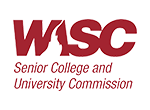
Post-Baccalaureate Certificate
in Trauma-Informed
Educational Practices
Courses start every Monday
Take the first step in your National University journey
200k+ Alumni Worldwide
Overview
Kids experiencing trauma are more likely to fall behind in class, get into trouble, or exhibit behavior issues. Trauma-informed teaching promotes an understanding and support of the whole student, helping create a positive learning environment, better student engagement, and improved academic outcomes.
You’ll explore the fundamentals and motivations behind a trauma-informed approach to education, how trauma manifests in different populations, specific trauma-informed strategies for the classroom, and practices for strengthening resilience among both students and educators.

The Western Association of Schools and Colleges (WASC) accredits public and private schools, colleges, and universities in the U.S.
Admission Requirements
A baccalaureate degree or higher from an accredited college or university.
Courses
For the Post-Baccalaureate certificate in Trauma-Informed Educational Practices, you must complete four courses and 12 credit hours. The estimated time needed to complete this certificate is 9 months.
Course Details
Course Listings
In this foundational course about trauma-informed educational practices, you’ll explore trauma from your own individual experience and perspective, as well as the collective perspectives held by our society. Part of the foundations you’ll examine include the differences in how children and adults respond to trauma, and how different types of trauma manifest in learners, instructors, and administrators across multiple educational environments. You’ll also consider which behaviors and dispositions might reflect underlying trauma, and the principles that can guide appropriate responses.
This course examines the different educational settings in which trauma can occur or manifest among different populations. You’ll consider issues of diversity, equity, inclusion, and social justice as you investigate specific groups that are more likely to experience trauma and identify practices that can minimize the risk of secondary trauma. You’ll also explore the impact of trauma within specific educational settings, paying particular attention to those educational practices that can exacerbate trauma.
This course studies the intersection of social-emotional development and trauma-informed educational practices that support a nurturing environment for educators and learners alike. This examination will include specific classroom elements, the language used by educators as they interact with students, and the content of curriculum and other instructional materials. The course teaches how to modify instructional strategies to align with trauma-informed educational practices, and it recommends instructional tools to support learners who may have been exposed to trauma. You’ll also learn effective techniques for de-escalating behaviors that may be rooted in trauma.
In this course, you’ll explore how the general concepts of individual and community resilience relate to broader trauma-informed practices across different educational settings. Understanding this relationship includes comparing the theoretical foundations of resilience and strengths-based approaches to teaching, training, and learning. You’ll interpret characteristics that reflect resilience, explore how self-care can strengthen resilience, and recommend instructional strategies that strengthen resilience among learners. You’ll also examine some challenges to resilience from the perspectives of educational equity and social justice.
Learning Outcomes
Students earning the Post-Baccalaureate Certificate in Trauma-Informed Educational Practices will learn to:
- Apply the concepts and practices of early childhood education
- Effectively communicate and conduct sound, open-minded research
- Address educational issues critically and reflectively
- Create solutions to problems based on knowledge, research, critical thinking skills, and collaboration
- Respect diverse cultures and backgrounds
- Demonstrate a commitment to the highest ethical and professional standards through accreditation
- Foster effective discussion of theoretical problems within the educational profession
- Nurture a commitment to life-long learning
Why Choose National University
- Four-Week Courses
- 75+ Degree Programs
- Online or On-Site
- Year-Round Enrollment
- Military Friendly
We’re proud to be a veteran-founded, San Diego-based nonprofit. Since 1971, our mission has been to provide accessible, achievable higher education to adult learners. Today, we educate students from across the U.S. and around the globe, with over 240,000 alumni worldwide.

“National University has impacted my career. You can immediately apply what you learn in class to your business.”
-Francisco R., Class of 2016
Program Disclosure
Successful completion and attainment of National University degrees do not lead to automatic or immediate licensure, employment, or certification in any state/country. The University cannot guarantee that any professional organization or business will accept a graduate’s application to sit for any certification, licensure, or related exam for the purpose of professional certification.
Program availability varies by state. Many disciplines, professions, and jobs require disclosure of an individual’s criminal history, and a variety of states require background checks to apply to, or be eligible for, certain certificates, registrations, and licenses. Existence of a criminal history may also subject an individual to denial of an initial application for a certificate, registration, or license and/or result in the revocation or suspension of an existing certificate, registration, or license. Requirements can vary by state, occupation, and/or licensing authority.
NU graduates will be subject to additional requirements on a program, certification/licensure, employment, and state-by-state basis that can include one or more of the following items: internships, practicum experience, additional coursework, exams, tests, drug testing, earning an additional degree, and/or other training/education requirements.
All prospective students are advised to review employment, certification, and/or licensure requirements in their state, and to contact the certification/licensing body of the state and/or country where they intend to obtain certification/licensure to verify that these courses/programs qualify in that state/country, prior to enrolling. Prospective students are also advised to regularly review the state’s/country’s policies and procedures relating to certification/licensure, as those policies are subject to change.
National University degrees do not guarantee employment or salary of any kind. Prospective students are strongly encouraged to review desired job positions to review degrees, education, and/or training required to apply for desired positions. Prospective students should monitor these positions as requirements, salary, and other relevant factors can change over time.